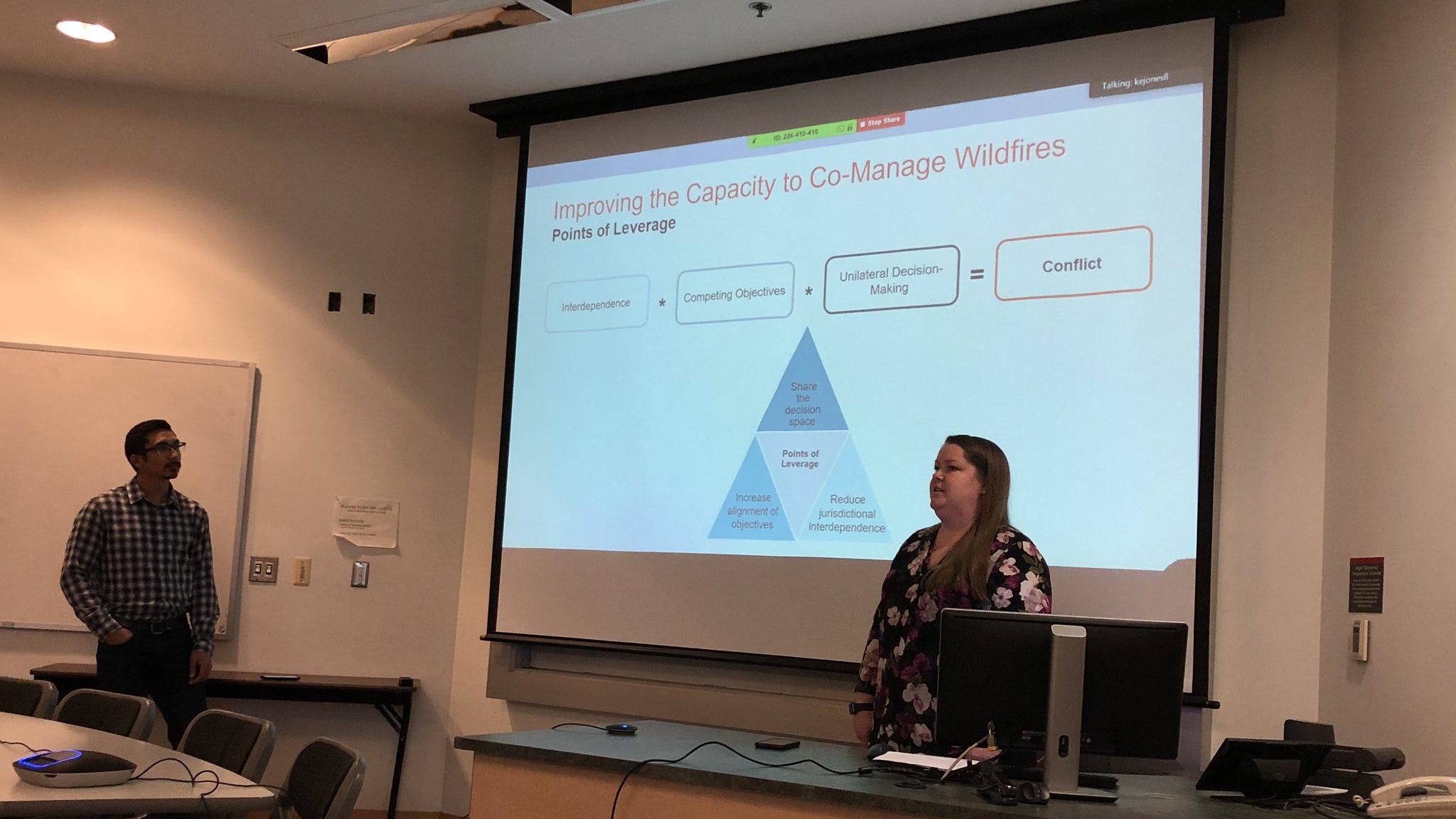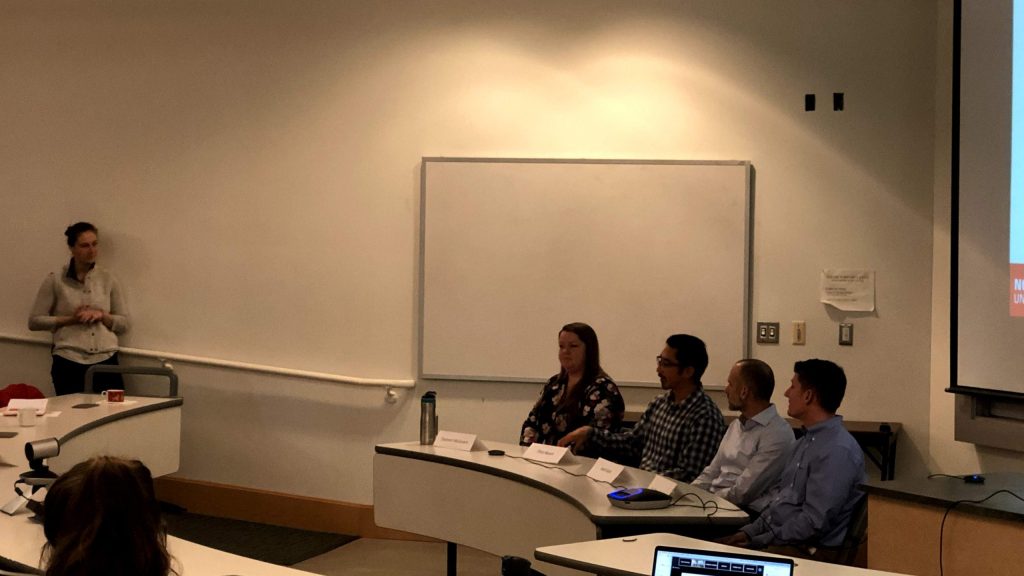Global Change Seminar Summary – Fire: Connecting Science, Management, and Policy

This post was written by 2019-20 Global Change Fellow, Kate Jones, summarizing the first seminar in the spring Global Change Seminar series, Fire: Connecting Science, Management, and Policy, on February 6, 2020. The discussion was also moderated by Kate Jones.
View a recording of the presentations.

Panelists:
Laurel Kays, NC State Department of Forestry and Environmental Resources Extension, Southern Fire Exchange
Jason Sacks, U.S. Environmental Protection Agency Center for Public Health and Environmental Assessment
Elliot Nauert, NC State College of Humanities and Social Sciences
Shannon McGovern, NC State School of Public and International Affairs
Dr. Robert Scheller, NC State Department of Forestry and Environmental Resources
Wildfires, specifically megafires, captivate the media for weeks at a time. The term megafire has risen in popularity to describe wildfires that are larger than 100,000 acres. With significant negative media surrounding wildfires, it is easy to lose sight of “good” fire, such as prescribed fires used to restore longleaf pines (Pinus palustris) in the coastal plains of southeastern United States. To demistify the important considerations and decisions that surround fire, both prescribed and wild, five panelists joined us to share their interdisciplinary perspectives at the first Global Change Seminar of spring semester.
Laurel Kays, an Extension Assistant with NCSU Forestry, began the seminar discussing the vibrant fire-focused community here in North Carolina and throughout the southeastern United States. Kays and her colleagues work closely with the Southern Fire Exchange, a regional wildland fire communication program. Together they support wildland fire practitioners and managers with resources such as “Learn and Burn” workshops, prescribed fire education days, fire festivals, and online training courses. The nature of the extension resources varies significantly from a traditional scientific journal publication. These resources are tailored to “boots on the ground” individuals by synthesizing current research in a single, accessible place, have a goal of interactive learning, and are shaped by participant feedback. Kays also shared several examples of successful co-production facilitated by NCSU Extension and the Southern Fire Exchange. Managers and scientists have joined forces to collaborate on current and future ecological concerns, such as prescribed fire with concentrated duff mounds and the shifting of future prescribed burning windows. Training for this type of joint problem-solving and other NCSU extension resources are under increasing demand as managers and practitioners adapt their fire plans for climate change.
Jason Sacks with the Environmental Protection Agency (EPA) shared how wildfires contribute to public health burden. He highlighted the data-centric phone app that the EPA has created to collect health information related to wildfires. Sacks discussed some of the knowns (and unknowns) when considering the relationship of wildfire to air quality index (AQI). Health information is easier to collect near a fire, but more complexities are introduced when considering how far smoke plumes can travel, the mixture of harmful particulates in wildfire smoke, and the effects of extended exposure. Data related to extended exposure is uniquely difficult to capture due to the nature of wildfire events – people often remove themselves from fire hazard areas, and after a wildfire has burned, it is unlikely for a fire of similar severity to burn in the same location. The EPA created Smoke Sense, a phone app, to combat some of these data collection difficulties. Smoke Sense allows willing users to report any symptoms and document if the symptoms prompted the user to change their behavior (i.e. leave the location, limit time outdoors, seek medical treatment, etc.). Smoke Sense was piloted in 2017 and has seen increased participation and many improvements to the app.
Shannon McGovern and Elliot Nauert, PhD students in the Fire Chasers research group at NCSU, touched on the administrative, logistical, and management concerns that accompany wildfire events. McGovern comes from the world of Public Administration, while Nauert is a psychologist by trade and has spent many hours on the ground fighting fires in the western United States. McGovern and Nauert’s different backgrounds speak to the interdisciplinary nature of the Fire Chasers, which enables their effective study of the multi-party dynamics of wildfire incident management. Managing fire requires attention to safety, human values, ecological health, and economics. These topics are sensitive, and the optimal decision can vary depending on the information at hand and the number of stakeholders (federal, tribal, state, county, private, etc.) at the table. The Fire Chasers aim to understand the organizational structures and institutional hierarchies that exist within different wildfire incident commands that are responsible for making these tough, multi-stakeholder decisions. The increasing size and duration of wildfire events forces more stakeholders to the table (typically geographic neighbors) and require the ability to problem solve with unfamiliar acquaintances. Understanding the communication channels, formal and informal, within wildfire incident command scenarios will allow for more effective and proactive training of individuals for these complex, multi-stakeholder scenarios. Ultimately, optimizing the rate and accuracy with which information is communicated before, during, and after a wildfire incident is one of the most critical elements for reducing risks and affecting positive outcomes.
Our last panelist, Dr. Robert Scheller, and the Dynamic Ecosystems and Landscape Lab study the future of forested landscapes, acknowledging fire as a critical agent of change. Dr. Scheller emphasizes the value of viewing ecological forecasting through the lens of “landscape trajectories”. For example: Without management, what is the ecological trajectory and long-term fate of a landscape? Can implementing management strategies alter the trajectory and long-term outcomes? These types of questions are increasingly important with frequent and increasing wildfires in the California Sierra Nevada. Land managers hope to understand the interconnected effects of climate change, prescribed burning and alternative management strategies, ecosystem health, and stakeholder community values. These factors coalesce to influence how wildfire risk is addressed in the near- and long-term. Scheller’s work in the Sierra Nevada indicates, despite average climate change projections, wildfire risk to communities can be reduced with persistent, and intentional management actions. However, involvement of all stakeholders through co-production is necessary for implementing sustainable management decisions and ensuring relevant scientific analysis.
The panel discussion following the presentations was immensely valuable, as it is all too rare to have multiple experts together to facilitate conversationally insightful Q&A. The Global Change Fellows would like to thank the speakers and those who attended the seminar online and in person. Lastly, thank you to the individuals who dedicated time and resources to planning this seminar. We look forward to the second seminar of the semester on March 5th.
- Categories:
